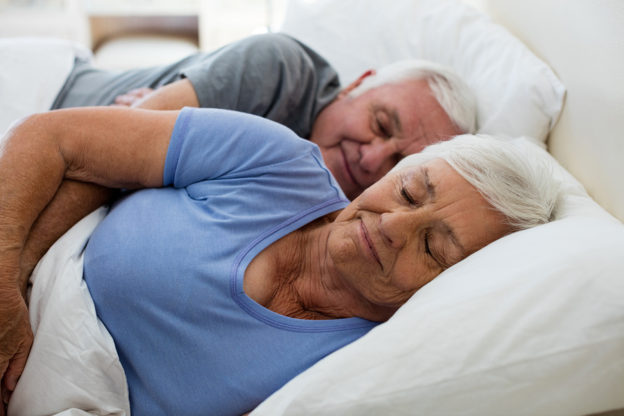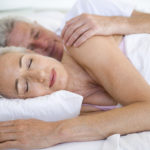By David Blyweiss, M.D., Advanced Natural Wellness
May 31, 2017
- Sleep is just as important as diet and exercise
- Here’s what can a good night’s sleep do for you
- What’s keeping you awake at night… and how to fix it
Some of my patients despair because they can’t get enough sleep. Others seem to think that sleep is over-rated… they have too much to do and don’t want spend their time in bed.
Well, you might be able to swing a few sleepless nights when you’re young. But if you continue to deprive yourself of sleep over the years, it’s eventually going to show up in one way or another.
It’s a sad fact, but people who don’t get enough sleep tend to die younger. They also have a higher risk of developing diabetes, high blood pressure and heart disease. Poor sleep habits even add to your chances of cognitive decline and Alzheimer’s disease.
But with just a few thoughtful changes, you can get all the sleep you need… every single night. And you can do it without taking dangerous sleep aids that leave you groggy and drain your brain.
Here’s what a Good Night’s Sleep can do for you
Open your arteries, improve blood flow for a new health miracle...
Did you know your circulatory system has over 60,000 miles of arteries, veins and other blood vessels, if stretched end to end?
But as you age, your blood vessels undergo changes, which may cause them to stiffen, thicken and get clogged.
GOOD NEWS! Doctors have now identified a “Miracle Molecule” inside your arteries that helps OPEN your arteries and IMPROVE blood flow.
It’s what Dr. Valentin Fuster calls it, "One of the most important discoveries in the history of cardiovascular medicine."To you, that means...
- Healthy blood pressure
- Sharper mind and memory
- Skyrocketing energy and muscular strength
- Increased pleasure and passion in the bedroom
- Improved circulation to every cell and organ in your body
Go here to discover a new natural way to significantly boost the levels of this miracle molecule in YOUR body NOW!
Sleep is just as important as diet and exercise. Among other things, a good night’s sleep can…
Boost your brainpower. While you’re snoozing, the events from the day are moved from short-term memory to long-term memory. Oddly enough, it’s also when your brain also “washes” itself. You see, sleep allows cerebrospinal fluid to rush between brain cells and pick up toxic waste products, like amyloid plaques and debris from the daily accumulation of oxidative stress.
Slow down aging. People who sleep five hours or less a night have telomeres that are significantly shorter than those who sleep more than seven hours a night. But older adults who regularly get seven or more hours of sleep have telomere lengths comparable to middle-aged adults. (Telomeres are the protective DNA caps on the end of your chromosomes that shorten each time your cells divide. The shorter they get, the more quickly you age.)
Keep you at a healthy weight. If you don’t get enough sleep it makes your levels of ghrelin rise. This is the “I’m hungry” hormone that makes you want to eat all of the time.
At the same time, it decreases levels of leptin – your “I’m full” hormone. So you never feel completely satisfied after eating.
However, when you enjoy a full night’s sleep, these two hunger hormones remain in balance to keep you from overeating.
Sleep loss also has an impact on your glucose metabolism and increases insulin levels. These are both associated with type 2 diabetes and obesity.
The World's Quickest Solution for Ending Prostate and Urinary Misery
This has recently been revealed to be one of the only real breakthroughs in prostate health.
The seeds of a strange fruit (sometimes called "Chinese Apples") hold powerful phytonutrients that are a revolution in prostate health.
In fact, UCLA and Veterans Administration research have now proved this to be true.
Not only that, but it may be the worlds quickest solution for ending prostate misery.
Simply stated, these phytonutrients represent a huge step beyond beta sitosterol, saw palmetto, and other phytosterols alone.
Simply click HERE if you want to have fast prostate relief...restful, uninterrupted sleep...no more constant "urges to go"...enhanced virility...and optimal prostate support for life.
What’s keeping you Awake at Night?
High-energy projects, electronic devices and bright lights can all keep you from falling asleep on time. So it’s a good idea to shut everything down – including yourself – about an hour before you want to drift off to sleep.
If middle-of-the night trips to the bathroom plague you, it would be prudent to avoid eating or drinking anything after about 7:30 in the evening. (If you get thirsty, just take a few small sips of water.)
An ill-defined sleep schedule can make it harder to fall asleep on time… and all too easy to wake up before you’re ready. Try to go to sleep at the same time every night and set your alarm for the same time every morning.
If these simple measures still leave you craving a good night’s sleep, here are a few supplements you can try.
To sleep longer and more deeply, I recommend a combination of valerian and hops. Valerian is a well-researched sleep herb that works just as well as a prescription sleeping aid, but does it naturally. When you combine valerian (500 mg.) with hops (120 mg.), it can improve both your quality of sleep and the amount of time you spend in deep sleep.
If you’re having a hard time re-setting your natural sleep cycle, take 3 to 4 mg. of melatonin about an hour before bedtime. If you’re new to taking melatonin, begin at 1 mg. and build up 3 or 4 mg. This nutrient can work wonders when it comes to re-setting your natural circadian rhythm…and why so many folks who change time zones when flying take it.
When your mind can’t stop racing long enough to let you fall asleep, try L-theanine. It promotes calmness by increasing alpha activity in the brain. This results in “relaxed alertness.” And, when your mind is calm, you can get to sleep a lot faster. Start at 50-100mg. . .shortly before bedtime and within a few days, go to 200 mg.
SOURCES:
Nagai M, et al. Sleep Duration as a Risk Factor for Cardiovascular Disease- a Review of the Recent Literature. Curr Cardiol Rev. 2010 Feb; 6(1): 54–61.
Lo JC, et al. “Sleep Duration and Age-Related Changes in Brain Structure and Cognitive Performance.” Sleep. 2014;37(7):1171-1178.
“Poor sleep in old age prevents the brain from storing memories.” UC Berkeley News Center. Jan. 28, 2013.
NIH/National Institute of Neurological Disorders and Stroke. “Brain may flush out toxins during sleep; Sleep clears brain of molecules associated with neurodegeneration: Study.” ScienceDaily. Oct 2013.
Jackowska M, et al. Short sleep duration is associated with shorter telomere length in healthy men: findings from the Whitehall II cohort study. PLoS One. 2012;7(10):e47292.
Cribbet MR, et al. Cellular aging and restorative processes: subjective sleep quality and duration moderate the association between age and telomere length in a sample of middle-aged and older adults. Sleep. 2014 Jan 1;37(1):65-70
Knutson KL. Impact of sleep and sleep loss on glucose homeostasis and appetite regulation. Sleep Med Clin. 2007 Jun; 2(2): 187–197.
Koetter U. et al, “A randomized, double blind, placebo-controlled, prospective clinical study to demonstrate clinical efficacy of a fixed valerian hops extract combination (Ze 91019) in patients suffering from non-organic sleep disorder,” Phytother Res. Sep 2007;21(9):847-51.
Zhdanova IV, et al, “Sleep-inducing effects of low doses of melatonin ingested in the evening,” Clinical Pharmacology & Therapeutics. 1995;57: 552-558.
Nobre AC, et al, “L-theanine, a natural constituent in tea, and its effect on mental state,” Asia Pac J Clin Nutr. 2008;17(Suppl 1):167-8







